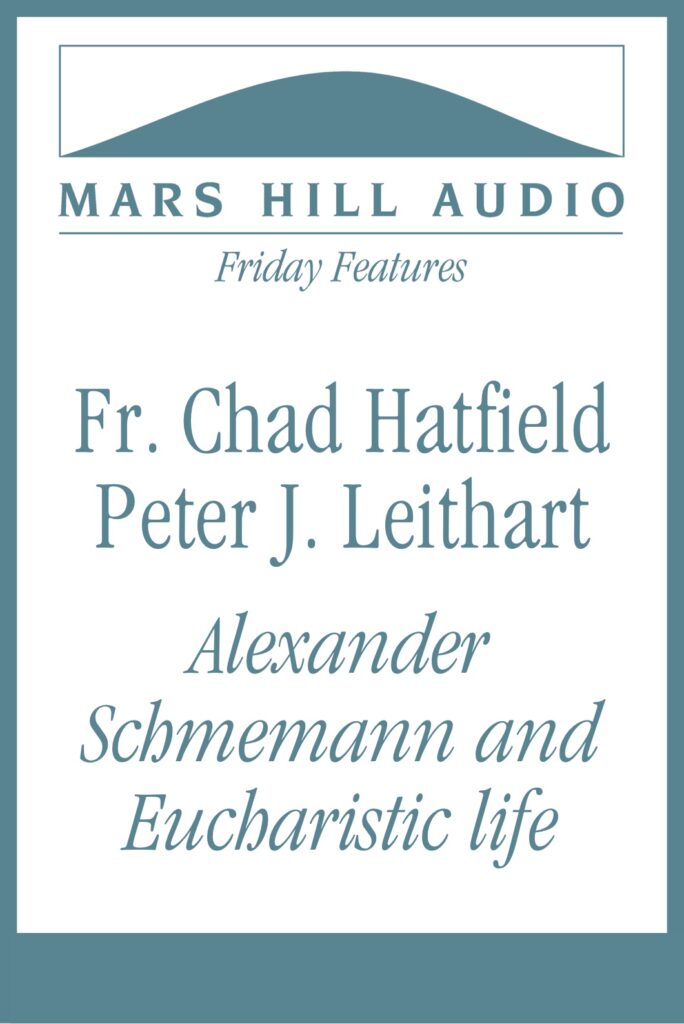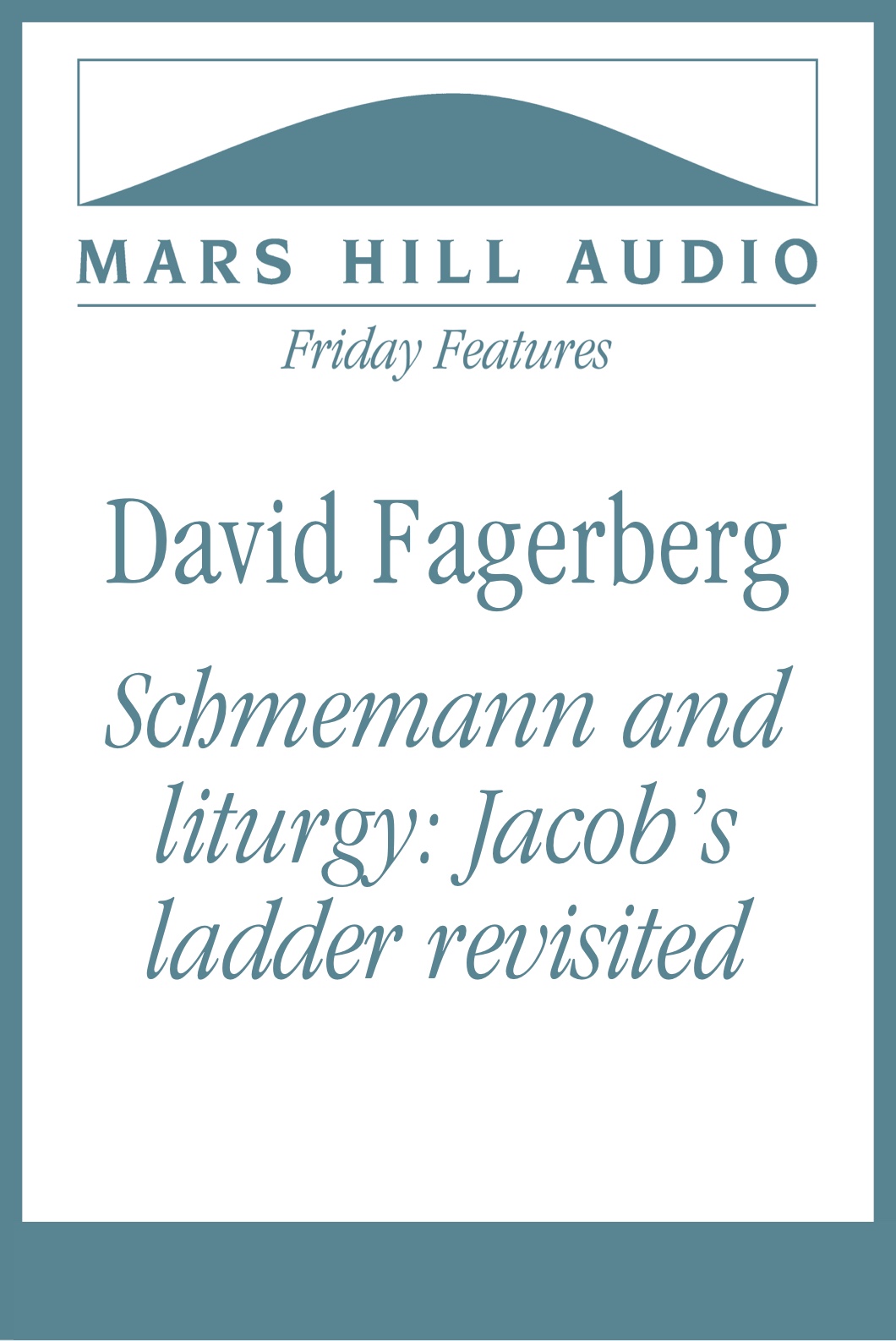released 5/3/2019
In 2019 Mars Hill Audio released an audiobook edition of For the Life of the World, by Orthodox theologian Alexander Schmemann. His book asks a set of questions about “Christianity and culture” that typically don’t get asked, questions that re-center our lives in gratitude and worship. Schmemann understood that we can’t understand what the world is — and what we should do in the world — unless we understand what the Church is. He wrote: “Christianity consists not in bestowing on each the possibility of ‘personal perfection’ but first of all in calling and commanding Christians to be the Church — ‘a holy nation, a royal priesthood, a chosen race’ — to manifest and confess the presence of Christ and his kingdom in the world.” On this Friday Feature, Fr. Chad Hatfield of St. Vladimir’s Orthodox Theological Seminary and Peter Leithart of the Theopolis Institute discuss the book with Ken Myers.
20 minutes
The full-length track for this audio is only available to paid members and to listeners with a free Visitor’s Pass. If you are a member, log in here. If you would like a Visitor’s Pass, sign in here. You may purchase one of our complete memberships here. Happy listening!
More to hear . . .
You might think that a book about liturgical theology would have little to say about the Church’s mission in the world. To the contrary, says theologian David Fagerberg: “The Church is the world in the course of transfiguration.” And thus: “The liturgical cult does not exist for itself, it exists for the sake of the world, for the sake of understanding and transforming the world. . . . There is bidirectional traffic in every liturgy. Within the sacred sphere we glimpse under sacramental veil the homage that matter can pay to God — water, oil, bread, hand laying, icon, incense, brick and glass, assembled bodies. Having seen this, we treat all material objects with new reverence.” On this Friday Feature, David Fagerberg talks with Ken Myers about how Alexander Schmemann — especially in his book For the Life of the World — illuminated such a view of liturgy, the Church, and the Kingdom of God.
This feature is available to listeners with a Mars Hill Audio membership.
Related reading and listening
- Coming unstuck from the earth — Henru de Lubac on how being heavenly minded makes one of immense earthly good
- Seasons and everyday saints — Sylvie Vanhoozer introduces a French Advent tradition that involves a community of “little saints” whose stories have something to teach us about following Christ throughout the year. (28 minutes)
- Critiquing “empire criticism” — Allan Bevere and Peter Leithart evaluate “empire criticism,” a way of reading the New Testament with an anti-imperial focus. (36 minutes)
- Unmasking claims of “secular neutrality” — Lesslie Newbigin on the Church’s prophetic duty concerning public life
- The kingdom of God has public consequences — Lesslie Newbigin on the subversiveness of the Church’s message to the world
- Sports in America — FROM VOL. 21 Robert Higgs looks at the history of sports in American experience and at how organized religion has interacted with that history. (12 minutes)
- Divorcing the spirit of the age — Thomas C. Oden on overcoming the theological faddism of the late twentieth century
- Developing a Christian aesthetic — In the inaugural lecture for the Eliot Society, titled “Faithful Imaginations in a Meaningful Creation,” Ken Myers addresses the question of the relationship between the arts and the Church. (59 minutes)
- Lessons from Leviticus — The book of Leviticus may be assumed to be irrelevant for charting a way through the challenges of modernity. Theologian Peter J. Leithart disagrees. (22 minutes)
- Mars Hill Audio Journal, Volume 159 — FEATURED GUESTS:
Kirk Farney, Andrew Willard Jones, James L. Nolan, Jr., Andrew Kaethler, Peter Ramey, and Kathryn Wehr
- Consecrating the world — Paul Evdokimov on the cosmic effects of the Incarnation
- “Christianity” is gnostic — Peter Leithart on why what the Church is and practices is not a “religion”
- Eternal seeds, temporal fruit — Henri de Lubac on how the Church should (and shouldn’t) make a difference in the world
- The simplicity beneath the complexity — Theologian Peter J. Leithart offers an outline of the book of Revelation, focusing on the themes of the challenge of faithfulness and the meaning of martyrdom. (46 minutes)
- David K. Naugle, R.I.P. — Philosophy professor, author, and compassionate mentor David K. Naugle (1952-2021) explains the long history of the concepts of “worldview” and “happiness.” (26 minutes)
- The impact of the rise of non-liturgical worship — Peter J. Leithart reviews Lori Branch’s book Rituals of Spontaneity, in which Branch argues that an “ideology of spontaneity” has led to the modern rise of non-liturgical forms of worship. (29 minutes)
- The meaning of “secularism” and its antidote — Alexander Schmemann on the grand modern heresy
- When “follow the science” doesn’t work — Peter Leithart reflects on the all-too-human nature of science and the effects of quarantine on the Church’s embodied mission. (32 minutes)
- The public and political dimensions of gratitude — Peter Leithart and Mark Mitchell both assert that gratitude has a public and political concern, and that Christianity caused a significant shift in the understanding of gratitude. (19 minutes)
- Deconstructing the Enlightenment — Peter Leithart discusses Johann Georg Hamann’s insights about the nature of language and his prophetic critique of the Enlightenment. (17 minutes)
- Questioning the “sacred-secular” division — With the stage set by Michael Sandel, Jean Bethke Elshtain, David L. Schindler, and John Milbank, Andrew Willard Jones examines a medieval alternative to the modern liberal paradigm. (61 minutes)
- Hans Boersma on For the Life of the World — Drawing from Alexander Schmemann’s book, Hans Boersma asserts that a recovered understanding of the relationship between God and Creation is essential to addressing a host of modern cultural crises. (17 minutes)
- David Fagerberg on Alexander Schmemann’s liturgical theology — David Fagerberg describes how Alexander Schmemann illuminated a deeply sacramental view of liturgy, the Church, and the Kingdom of God. (22 minutes)
- Peter J. Leithart on Church unity — Peter J. Leithart discusses how the sixteenth-century Colloquy of Marburg shifted the understanding of the Eucharist from something that Christians primarily do together to something about which Christians think or believe a certain way. (70 minutes)
- Mars Hill Audio Journal, Volume 136 — FEATURED GUESTS:
Thomas Albert Howard, Mark Noll, Andrew Pettegree, Peter J. Leithart, Norm Klassen, James Litton, and Joseph O’Brien
- Peter J. Leithart: The Cultural Consequences of Christian Division — Peter J. Leithart discusses how the sixteenth-century Colloquy of Marburg shifted the understanding of the Eucharist from something that Christians primarily do together to something about which Christians think or believe a certain way. (69 minutes)
- In defense of unity — Peter J. Leithart on the relationship between ecclesial unity and religious liberty
- Is religion just moralistic therapy after all? — Alexander Schmemann on the secularization of religion
- Not just a counterculture — Peter J. Leithart on the public (and prophetic) mission of the Church
- Assimilation or identity in Christ — Francisco Javier Martínez Fernández on the modern choice given the Church to conform or die
- The Church as a public reality — William Cavanaugh on how we must be disciples in public, not just citizens
- Intellectual apostasy and Christian witness — Harry Blamires on unfashionable beliefs about the ends of human beings
- Cultural participation in reconciliation — Jonathan Wilson on faithfully representing Creation in the culture of the Church
- The publicly inert Christ of modernity — Dom Anscer Vonier on secularism’s confidence in its freedom from Christ
- Which story is ours? — “Instead of allowing the Bible to shape us, we may in fact be allowing our culture to shape the Bible for us.”
- The dead-end of privatized faith — T. S. Eliot on the Church’s duty to interfere with the World
- True transcendence, true immanence — D. C. Schindler on how believers can be practical atheists
- The disabling consequences of winsomeness — Stanley Hauerwas on how many modern Christians offered atheists less and less in which to disbelieve.
- Mars Hill Audio Journal, Volume 119 — FEATURED GUESTS:
Mary Eberstadt, Allan Bevere, Peter J. Leithart, Steven Boyer, Karen Dieleman, and Peter Phillips
- Crowd Culture — Bernard Iddings Bell: “It is because the Church has thus obscured the socially prophetic note that it seems to most people to have no relevancy.”
- Who strangled God? — James Turner examines the ways in which the pursuit of “relevant” theology helped to make atheism plausible in Western culture
- Mars Hill Audio Journal, Volume 104 — FEATURED GUESTS: James Le Fanu, Garret Keizer, Daniel Ritchie, Monica Ganas, Jonathan Wilson-Hartgrove, and Peter J. Leithart
- Mars Hill Audio Journal, Volume 92 — FEATURED GUESTS: Jake Halpern, Stephen J. Nichols, Richard M. Gamble, Peter J. Leithart, Bill Vitek, and Craig Holdrege
- A forgotten prophet — Eugen Rosenstock-Huessy: “Moderns are puzzled by the perfectly unsystematic, irrational, antilogical institution, the poorest organization on earth but yet fully alive — the family.”

